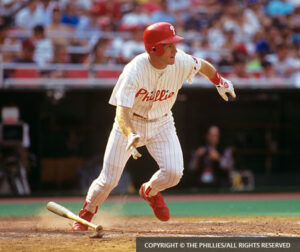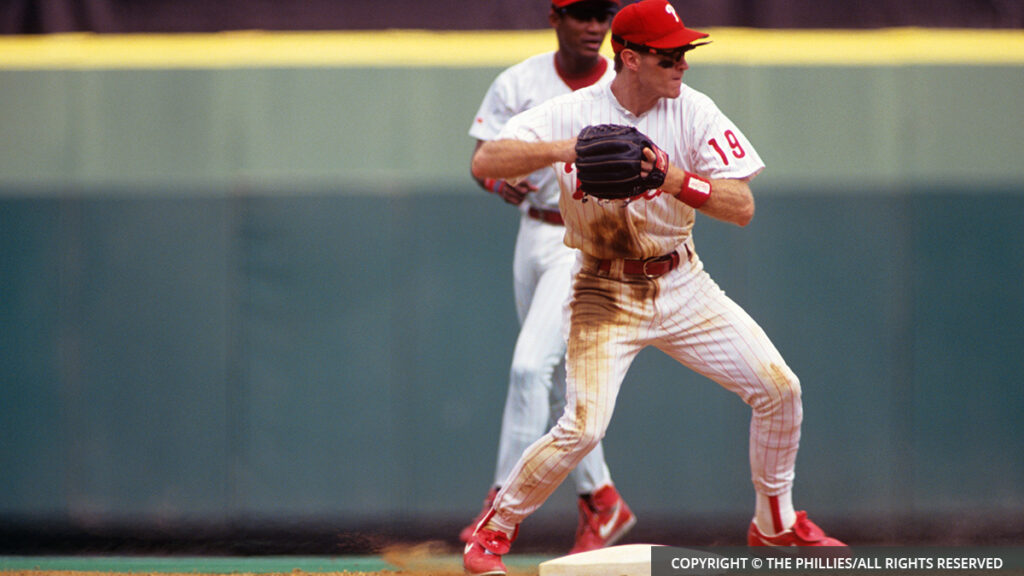Cell phones were hardly en vogue when Kevin Stocker found himself among the potential selections in the 1991 Major League Baseball Draft.
Most baseball pundits expected Stocker, who had just finished an impressive junior season as the starting shortstop at the University of Washington, to be taken in one of the early rounds. Yet by the evening of June 3, the first day of the draft, the Spokane Valley native and 1988 Central Valley High grad was still waiting.
“I figured by early afternoon, I’d be getting a phone call if I was taken in one of the first few rounds,” recalls Stocker who was taking finals at the time.
That May, the Chicago White Sox, New York Yankees and Chicago Cubs had reached out to Stocker, who was eligible for pro baseball after three years at UW. He had not considered baseball as a career option until after his sophomore season.
Turns out the team who picked the standout infielder had trouble finding his number.
By around 8 that night, Stocker was called to pay phone on the Seattle campus. A representative of the Philadelphia Phillies was on the line, letting him know that he had been picked in the second round, 54th overall.
The team had to go through Kevin’s parents, Chuck and Lu in Spokane Valley, to find out how to reach him. Bill Harper, a regional scout for the Phillies, eventually met with Stocker and his dad to discuss his first contract and signing bonus.
“They offered $100K at first,” Stocker said. “I remember Bill getting on the phone with the Phillies’ scouting department. I wanted $140K to sign. We got to $130K and Bill says, ‘We’ve never paid that much to any second round pick.’”
Stocker took a break from the negotiating table and went for a walk in nearby parking lot. At first, he had no intentions of budging from his request. Finally, he settled for the Phillies’ offer with the rationale that “you make your real money in the big leagues.”

Position: Shortstop
Bats: Both, Throws: Right
Height: 6′ 0″, Weight: 178 lb.
Born: February 13, 1970 in Spokane, WA
Stocker, now 49, will be the first to tell you that times – and signing bonuses – have changed from his day. While broadcasting the college baseball post-season last week, Stocker was part of coverage that included updates from the 2019 MLB Draft. Oregon State, one of the teams in the super regional Stocker was covering, boasted the No. 1 overall pick in junior catcher Adley Rutschman, who will be paid $8.2 million by the Baltimore Orioles just to sign on the dotted line.
Had Stocker been the 54th selection this year, he could have walked away with a bonus of over $1.3 million.
At 21, Stocker was wise with his signing cash. He was paid in two installments of $65,000 and spent part of the first portion on a two-door Honda Accord. The rest went into savings. These days, his penchant for less-than-flashy but reliable vehicles continues as he can be found behind the wheel of a Honda truck.
Stocker, who has lived in Liberty Lake with his wife Brooke since 1999, has no bitterness about missing out on the big baseball money of today. He played in the major leagues from 1993 to 2000 with the Phillies, Tampa Bay Rays and Anaheim Angels, posting a career .254 batting average and committing only 116 errors in 3.756 chances at shortstop.
Stocker had a less-than-auspicious start to his pro career after reporting to the Phillies’ low-A farm team in Spartanburg, South Carolina, the first time he had been east of the Mississippi River. Earning a salary of $750 a month, the highly touted pick hit only .220 over his first two months. Still, Stocker’s defense was stellar and he received encouragement in the dugout.
“I think it was just the pressure I was putting on myself,” he said. “As a young player, you think they’re going to release you. On the team’s end, they know you’re going to stay around so they say you’re doing great. They want you to move through the minor leagues as quickly as possible.”
Things improved for Stocker the following year as he adjusted to a wood bat from his aluminum days in college. He rose to the AA-club in Redding, Pennsylvania by the end of 1992, hitting .250 and continuing his defensive handiwork. Later that year, in the Arizona Fall League, his average elevated to over .300.
That winter, while working out at Hec-Ed Pavilion on the UW campus, Stocker got a call from the Phillies, informing him that he would be a non-roster invite to the big league camp the following spring. While he did not make the final cut, Stocker impressed the Phillies’ brass. In early July, while playing at AAA Scranton, he got the call every baseball player hopes for.
 Stocker’s first big league game with the Phillies came on July 7, 1993 against the Los Angeles Dodgers in Philadelphia. The starting lineup posted in the dugout included the rookie’s name on a patch of tape, not the ornate plates used for veteran players. In a game that went 20 innings, Stocker came up with a critical throw to the plate in the top of the 10th inning, preventing a Dodgers’ run. The Phillies eventually won 7-6.
Stocker’s first big league game with the Phillies came on July 7, 1993 against the Los Angeles Dodgers in Philadelphia. The starting lineup posted in the dugout included the rookie’s name on a patch of tape, not the ornate plates used for veteran players. In a game that went 20 innings, Stocker came up with a critical throw to the plate in the top of the 10th inning, preventing a Dodgers’ run. The Phillies eventually won 7-6.
Stocker would go on to hit .324 in 70 games for the Phillies who won the National League pennant for the first time in a decade. Philadelphia advanced to face the Toronto Blue Jays in the 1993 World Series, falling in six games. It would be 15 years before the team appeared in another Fall Classic.
These days, Stocker is adjusting to life as an empty nester with Brooke. They are proud parents of three grown kids – McKenna, Logan and Zach – all CV grads. Stocker has established a successful career as a broadcaster with the Phillies, CBS College Sports and PAC-12 Networks.
Looking back 28 years ago this month to his draft day adventure and foray into the majors, Stocker still rings with game-day enthusiasm.
“You’re excited, you’re anxious,” Stocker recalls of breaking into pro ball. “You realize that if you want extra hitting, that’s your problem. You learn to think of it as a career, not just playing baseball.”


